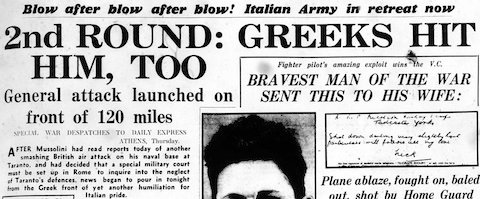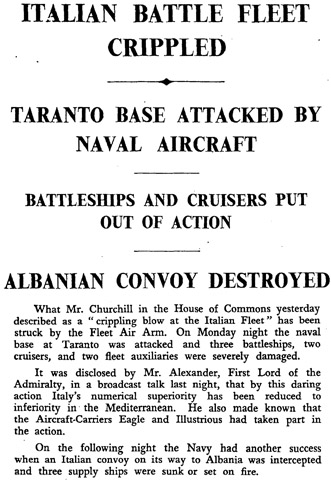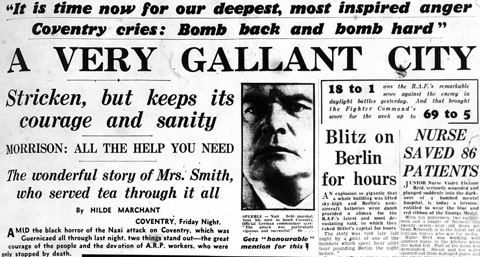
It seems that Mussolini’s attempt to annex Greece may have been somewhat ill-judged. The Daily Express leads with news of a Greek counteroffensive against the Italian forces invading their country from Albania. A spokesman for the Greek government said that their ‘troops were advancing along the whole line’.
The offensive opened with a savage attack from the kilted Evzones, supported by cavalry, infantry, mountain guns, tanks and British and Greek planes.
This is the icing on yesterday’s cake. The leading article on page 4 takes the Taranto raid as a turning point in the war:
FROM now on Britain must stay in top gear and go full speed ahead.
More smashing blows against Italy while she still reels from the effects of Taranto.
More bombs on German factories and fields.
And so on. The Daily Mirror takes much the same line (5):
WHAT does our success this week in the Mediterranean prove?
First, obviously, that the process of socking the Wop has begun.
Ah, that was not the bit I meant. Here it is:
But it proves more than that.
It proves that initiative, daring, the offensive spirit, brains directing risky operations can, after all, hasten the end of the war.
From different political positions (the Mirror broadly left, the Express definitely right, both populist and very popular) both papers are saying that Britain needs to take the offensive. But the Express seems a little less optimistic, saying only that this will ‘bottle up the enemy’s means of attacking us’, not help ‘hasten the end of the war’ as the Mirror has it.
The City is certainly pleased with the news, with many shares rising yesterday: ‘It’s been a really wonderful day for plus signs’ (Daily Express, 2). Dawes bonds were up 10s. to £6, and Young bonds by about the same to £4. The significance of this is that these are German debts, and will presumably only be redeemed after the war:
Jobbers’ theory is that, with the junior partner of the Axis running into difficulties, it might not be so long before the senior partner has to start paying out some real money on its pre-war obligations.
On to the Blitz — or ‘airblitz’, as Basil Cardew calls it in an Express article which asks (4)
WHO will be the men to lead the greatest airblitz the world has ever known — to lead the R.A.F. in their vast offensive against the military economic life centres of Germany and Italy?
(It’s up to Air Chief Marshal Portal to decide, ‘Our new forty-seven-year-old airblitz leader’.) Hilde Marchant, who writes the weekly column ‘A woman looks at the war’, has been touring the Welsh countryside with Herbert Morrison, Minister for Home Security. They have had to deal with bombing too: one ‘grey stone hamlet’ has ‘already had two of the heaviest types of bombs on its farms and fields’ (4).
In other villages I found shepherds who leave their sheep with their dogs on the alarm and come into the village street to give the warning. These are the people who throughout South Wales organised a hundred different voluntary rural defence services. Not one of these people is paid or asks for payment.
Even though they have an ‘exaggerated idea’ of ‘the damage in London’ they wish they could take it too. Or at least one woman does:
We would do anything to take just one of those nights off London. But while you stick it we shall work here so that one day we shall strike back with you.
Back in London, specifically at the Old Bailey, the Recorder of London Sir Gerald Dodson has been hearing looting cases. Dodson said (presumably in court) that giving lenient sentences to looters has failed to deter the crime, and referred to ‘”the heaviest penalty” which “a wise Legislature has made available”‘ (5). The Express interprets this as a hint that looters may be executed in future, though the heaviest sentence actually handed out yesterday was eighteen months’ jail.
A letter from ‘Air Raid Warden’ of Ruislip is published on page 5 of the Mirror:
I am writing to let you know that on Friday, November 8, I saw a vision of Christ with a crown of thorns on his head and dressed in flowing robes.
There was an angel on either side of him. I called a telephone worker and pointed it out to him. The vision came and went during about five minutes.
The somewhat cryptic response:
ANSWER: Everybody’s seeing visions just now.
Trouble is, they keep seeing the same one at totally different times and places.
Oh, and the impressive head of hair in the photo on the front page of the Express at top belongs to Flight-Lieutenant James Nicolson, VC. The Mirror used the same photo on its front page today, too.
![]() This work is licensed under a Creative Commons Attribution-NonCommercial-NoDerivatives 4.0 International License.
Permissions beyond the scope of this license may be available at http://airminded.org/copyright/.
This work is licensed under a Creative Commons Attribution-NonCommercial-NoDerivatives 4.0 International License.
Permissions beyond the scope of this license may be available at http://airminded.org/copyright/.




Pingback: Airminded · Monday, 18 November 1940